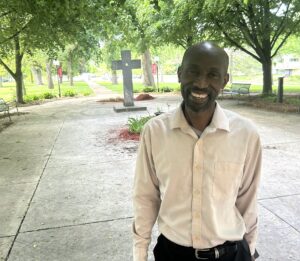Recent Luther Seminary graduates Nicky Nossyr and Tito Oiero received at commencement the John Milton Prize in Old Testament. Nicky was recognized for his paper “Genesis in Esther: Exploring the Intertextual Relationship,” and Tito for his paper “Deliverance: A Case Study of Israel’s Emancipation from Egyptian Bondage in view of Neo-Liberal Capitalism, and a Biblical Approach toward Economic Freedom.”
Nicky Nossyr
Where did you grow up, what did you study as an undergraduate, and what led you to pursuing theological education?
I grew up near Forest Lake, MN, and pursued biblical and theological studies for my undergraduate degree. I felt a call in my life toward some form of ministry and have loved academic study of the Bible since high school. When I heard about Luther Seminary’s jubilee scholarship, I decided it might be a good time to continue my education.
What are you hoping to do with your Luther Seminary degree?
I’m not sure. I currently work full-time in a secular, special-needs secondary school, and I really enjoy it. I would love the opportunity to teach the Bible vocationally, and at some point I would like to pursue a doctorate in biblical studies or an adjacent field. Ministry-wise, I have taught a few classes in my church since undergrad but hope to make it a much more regular occurrence once I have less homework. In any case, I firmly believe biblical literacy is critical to spiritual maturation and hope to be part of equipping and training the church in that way, in whatever manner God directs me.
Talk about the paper you submitted for the Milton prize. Why did you want to dig into this topic?
The paper I wrote was also my capstone research project, though in a compressed form. The paper, titled, “Genesis in Esther: Exploring the Intertextual Relationship,” tries to do exactly that. It demonstrates that the author of Esther is aware of at least a proto-Genesis, and makes liberal use of the themes and motifs from that document. My thesis is that the author of Esther sought to ground the disorienting experience of Persian exile by demonstrating a continuity with foundational Genesis stories, and reassuring his audience that God has elected and will not abandon the Jewish people, regardless of appearances.
How would you contextualize that piece of scholarship (this paper) with your overall scholarly work here at Luther?
I have, at least since undergrad, been fascinated with the intertextual relationships between Biblical books. Particularly, how the biblical authors adopt and adapt pre-existing authoritative stories and texts for their own emerging contexts, and how can we learn from their model for today? This paper gave me the opportunity to propose and elaborate on a relationship which has not yet been well explored, and in the process I got what feels like a first hand glance into how this process or interpretation and recontextualization may have operated during the Persian exile. It feels like a bridging of worlds, bringing together texts which are in the same canon, but are often viewed as almost unrelated due to their classifications, settings, and perceived value for the church.
What’s one thing people don’t know about you?
For the last two years I have been teaching a high school yearbook class—though I am almost entirely without photography, graphic design, aesthetic or organizational skill. Somehow, both books turned out well and the students had fun in spite of my support!
Tito Obiero
Where did you grow up, what did you study as an undergraduate, and what led you to pursuing theological education?
I was born in Nyamwanchania village in the Nyamira District of Kenya, on the eastern shores of Lake Victoria. My academic performance throughout my youth was varied, and when I did not succeed, I always returned to praying, seeking support from my family, and listening to my faith communities. God eventually led me to ministry as a chaplain, to additional education, and to leadership in a parish setting.
What are you hoping to do with your Luther Seminary degree?
After six years in ministry in Kenya, God opened a path for me to Join Luther Seminary, and I am about to graduate with an M.A. in Biblical Studies. My experience at Luther has been great and provided me an excellent academic foundation. I now wish to enhance my career in ministry by studying professional counseling, so that I can blend my life experiences with my pastoral ministry. It is becoming more difficult to reach people by preaching the Word in conventional settings. People around us are suffering and hurting, yet many of them shy away from formal religious settings. A life of individualism is closing many from our reach, but if I can listen to them more carefully and talk with them in ways that are meaningful, I hope to offer hope not only for this present life but also for hope in eternal life with Christ.

Tell us about the paper you submitted for the Milton Old Testament prize. What drew you to this topic?
This paper was conceived in the God and Economy class I took last summer with Professor Isaac Horwedel. It was an eye opener, for sure. I also offer much gratitude to professor Kathryn Schifferdecker for her guidance in helping me crystallize my ideas. This paper seeks to address the ever widening global economic disparity and how it may be solved on the basis of biblical principles. The paper compares the suffering of the underprivileged in the social-economic hierarchy with the tribulations of the nation of Israel in Egyptian bondage. It shows the futility of human efforts to solve the crisis apart from divine intervention. It further demonstrates that the Bible has an answer to this misfortune, and that both the perpetrator and the victim are in need of deliverance.
What is something people don’t know about you?
My favorite hobby is hiking and exploring the woods. I am a lover of flowers and the beauty of landscapes.